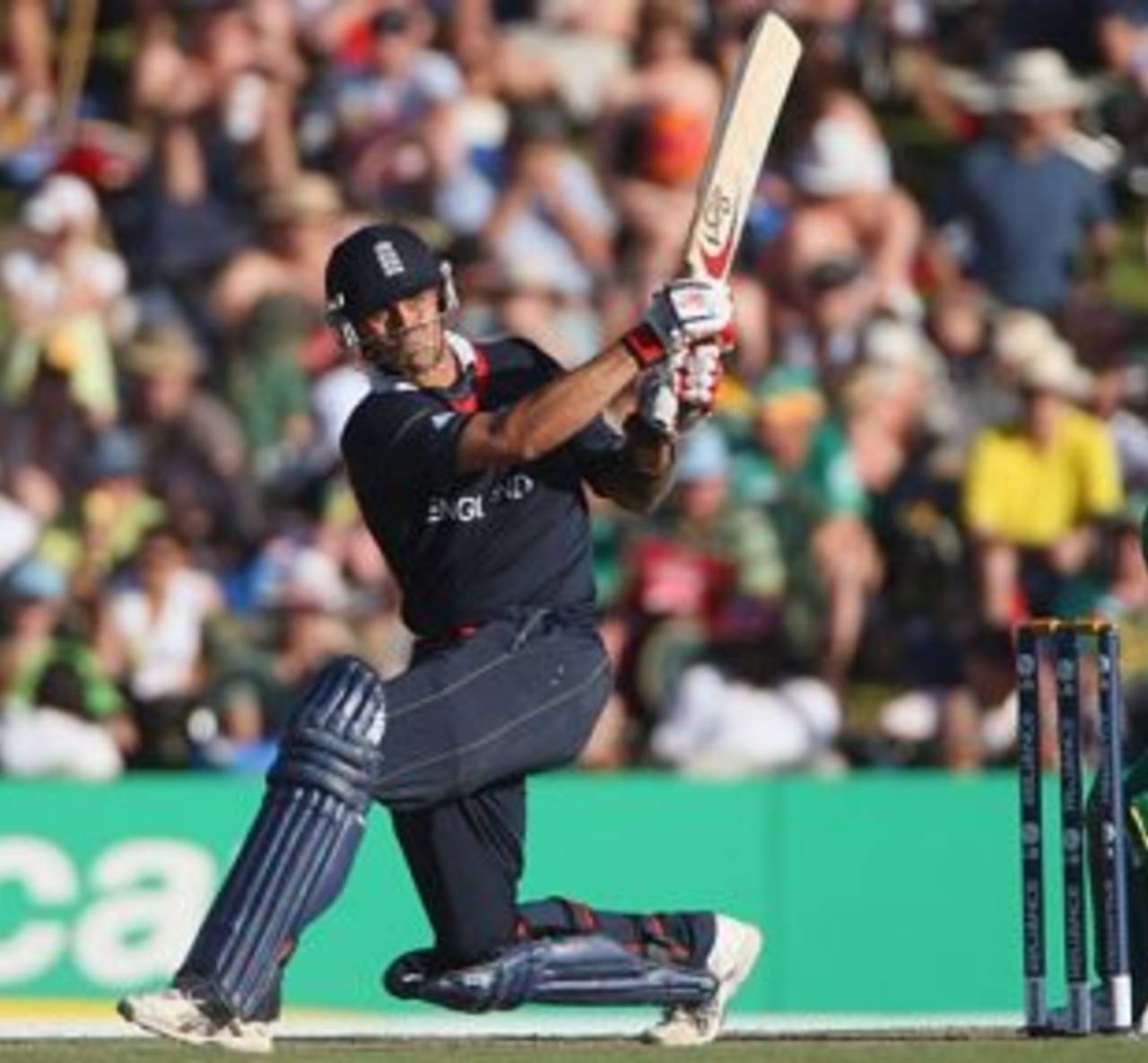Can England continue to surprise?
They came into this tournament as no-hopers, yet England now find themselves in the semi-finals. But, in many ways, that's just typical of them
Osman Samiuddin in Centurion
01-Oct-2009

Owais Shah's innings against South Africa was something rarely seen from an England batsman. But was it a one-off, or can he repeat it? • Getty Images
The real story of this tournament, and also the result its format made possible, is the progress of England through to the semi-finals. Their men have played open, flowing cricket no one thought them capable of playing and the team has won matches no one thought it possible for them to win. Also vindicated is the power of ODIs still to surprise us, especially if conditions are right. Precisely because of what preceded this, they have been unrecognisable in this tournament.
To be honest, this is no surprise. Over the last few years, England have won what was generally thought to be the toughest tri-series in the world, the CB Series in Australia, won an ODI series in Sri Lanka (which still doesn't happen that often), won an ODI series against India at home and beat the world's best ODI side 4-0, also at home. But they have also been thumped 5-0 in India, lost ODI series to New Zealand home and away, had an awful World Cup and been emphatically trampled upon 6-1 by Australia before coming here.
They have looked, at times, to have hit upon just the right formula in their ODI XI, yet the very next day looked as if ODI cricket was a game from another planet. It is an extremity of performance and result unmatched in world cricket and it is saying something that they have been more difficult to predict than Pakistan.
For the last decade, the popular belief is that they are rubbish at limited overs cricket and worse, indifferent to it. That is not entirely true, else they would've won less over the last two years than they have. But there appears great uncertainty to how they want to go about the format, unsure of how to play it and who to play in it: Pakistan's troubles with opening pairs pale in comparison to England's, they're forever fiddling with their bowling attack, they've seemed unhealthily obsessed with format specialists, they've tried split captaincy and the current captain was not even part of their ODI thinking not so long ago.
It's not that the tools are entirely unfit for the task - even if some selections, like their early 90s Test picks, have been strange - but the thinking has forever been hazy; itself bizarre given how clear-headed England ODI sides of the 80s and early 90s were.
The funk needs to be resolved and maybe Andrew Strauss and Andrew Flower are the men for the job. On arriving here, the pair spoke of trying to overturn decades of ODI mediocrity, which is a cultural shift more than anything and not just matters of form, technique or strategies; ODIs have lost stock in England and even if players might not mind playing it, the ECB's decision to ditch the format domestically seems both to be jumping the gun and indicative of the low esteem in which they hold 50-over cricket. Two games, or possibly four, will not change that but perhaps something clear can emerge from it.
For one, holding onto the video of their batting against South Africa as if it were gold is an idea. In recent memory, it was the most uninhibited collective performance by English batsmen, shed of all the timidity that regularly grips them. From recall, the last time England were so brutal was in 1992, in a home ODI series against Pakistan, at Trent Bridge, when they took Wasim, Waqar, Mushtaq and Aaqib for 363 runs in 55 overs.
Owais Shah was behind it and though he always looks like he should be an adept ODI player - and not a poor Test one either - he has somehow rarely looked like being one. He can hit big as well and though his areas are limited, power-hitting is a modern ODI commandment without which batting sides will struggle. The fuss over his running is overdone; Inzamam-ul-Haq, Rahul Dravid and Mohammad Yousuf are in the top five run-out victims of all time and it never stopped them from being tremendous ODI players.
In Eoin Morgan, Ireland have found and England benefited from, a player people are eager to put tags on. He has good wrists and more scoring options to one ball than many of his colleagues and that is a useful trait during the middle and end overs. He also plays most of ODI cricket's modern shots; the reverse, the paddle, the scoop and whatever else. But is it not a worry that he often tries to do too much to fulfil the specialist label? Sometimes, as when Yousuf is around, limited overs batting is a very simple game, of playing uncontrived strokes and good running.
Others to do well here will be crucial; James Anderson has settled in, finally; the captain himself, to set the tone at the top of the order and Paul Collingwood, a proper ODI veteran in England's side and often at the heart of their more significant wins. Kevin Pietersen will be back soon and Andrew Flintoff, when not busy house-hunting in Dubai and freelancing, will always be a welcome addition to any side. And in Flower they have a man who knows how to be good at ODIs.
It is too much to expect that fortunes will change immediately on the basis of their brief run here - there is enough history to suggest it won't - but, with the tools they have in their hands, to waste this opportunity would be a monumental cock-up - even for England.
Osman Samiuddin is Pakistan editor of Cricinfo